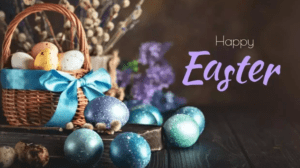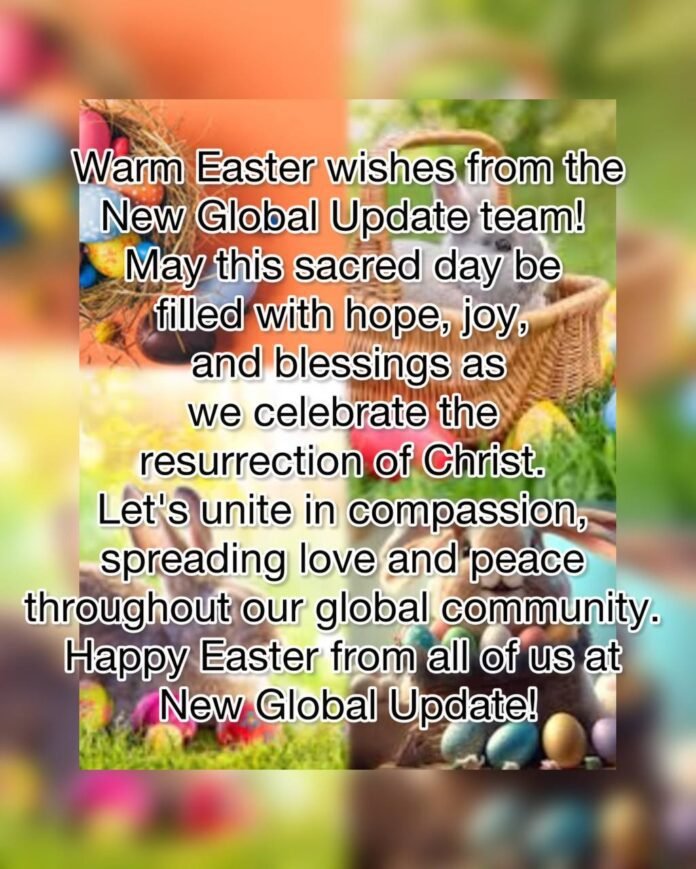President Joe Biden and I extend our heartfelt wishes to Christians worldwide observing Easter Sunday. This occasion serves as a poignant reminder of the enduring strength of hope and the profound promise embodied by Christ’s Resurrection.
Amidst gatherings with loved ones, we reflect on the selfless sacrifice of Jesus, offering prayers for each other’s well-being and embracing the endless opportunities for renewal. In a world marred by conflicts and strife, we reaffirm our dedication to fostering peace, security, and dignity for all individuals.
With warm regards from our family to yours, we wish you a joyous Easter filled with God’s blessings.

SummaryEaster is a Christian festival celebrating the resurrection of Jesus Christ, observed annually. The date of Easter varies each year and is determined by the lunar calendar. Easter traditions include egg hunts, the Easter bunny, and hot cross buns, symbolizing new life and rebirth. The Easter Lily and religious processions are significant symbols and observances associated with Easter. Holy Week precedes Easter, featuring Palm Sunday, Maundy Thursday, Good Friday, and Holy Saturday, leading up to Easter Sunday. |
Easter, a time of renewal, reflection, and rejoicing, holds a special place in the hearts of millions around the world. As spring blossoms forth with new life, Easter brings with it a sense of hope, rebirth, and the promise of brighter days ahead. It’s a time to gather with loved ones, indulge in festive treats, and embrace cherished traditions that span generations.
For many, Easter signifies more than just a religious observance; it’s a symbol of hope and a reminder of the power of faith. Christians commemorate the resurrection of Jesus Christ, symbolizing the triumph of life over death and the promise of salvation. Churches are adorned with vibrant flowers, echoing the joyous spirit of the season, while worshippers come together to celebrate this pivotal moment in their faith.
But Easter transcends religious boundaries, extending its warmth and joy to people of all backgrounds and beliefs. It’s a time for families to come together, whether around the dinner table or in the backyard for an Easter egg hunt. Children eagerly anticipate the arrival of the Easter bunny, who hops through gardens and parks, leaving behind a trail of colorful eggs and sweet treats.
As we immerse ourselves in the festivities of Easter, it’s also a time for reflection and gratitude. Amidst the laughter and merriment, we pause to appreciate the blessings in our lives, from the love of family and friends to the beauty of nature that surrounds us. Easter serves as a gentle reminder to embrace kindness, compassion, and generosity, spreading joy to those in need and lifting spirits through acts of goodwill.
New Global Update- your speediest source for breaking news! READ NOW →
The traditions of Easter vary from region to region, each adding its own unique flavor to the celebration. In some cultures, elaborate parades and processions take center stage, while in others, it’s a time for quiet contemplation and intimate gatherings. From the intricately decorated Easter eggs of Eastern Europe to the colorful bonnets and baskets of Western traditions, each custom adds to the tapestry of Easter festivities.
Amidst the hustle and bustle of modern life, Easter offers a moment of respite—a chance to pause and savor the simple pleasures that bring us together. Whether it’s sharing a meal with loved ones, participating in age-old traditions, or simply basking in the beauty of nature, Easter invites us to slow down, connect with one another, and celebrate the abundance of life.
So let’s revel in the magic of Easter, if only for a while. Let’s cherish the moments spent in the company of those we hold dear, and let’s carry the spirit of renewal and hope with us long after the Easter eggs have been found and the last chocolate bunny eaten. For in celebrating Easter, we celebrate the timeless values of love, faith, and joy that unite us all.

History Of Easter
The history of Easter is rich and complex, intertwining ancient pagan rituals with Christian traditions. The origins of Easter can be traced back to pre-Christian times when various cultures celebrated the arrival of spring and the renewal of life. Many of these celebrations revolved around the vernal equinox, a time when day and night are of equal length, signaling the end of winter and the beginning of spring.(also read: Good Friday 2024).
One of the most prominent influences on the modern Easter celebration is the ancient festival of Eostre, an Anglo-Saxon goddess of fertility and spring. Eostre’s feast day was celebrated around the same time as the Christian observance of Easter, and it is believed that many of the customs associated with Easter, such as the decorating of eggs and the use of rabbits as symbols of fertility, originated from these pagan traditions.
The Christian celebration of Easter is closely linked to the Jewish festival of Passover, which commemorates the liberation of the Israelites from slavery in Egypt. According to the New Testament, Jesus Christ was crucified and buried during the Jewish Passover, and his resurrection occurred three days later, on what is now celebrated as Easter Sunday. For Christians, Easter represents the culmination of Jesus’ ministry on earth and the triumph of life over death.
The exact origins of the name “Easter” are uncertain, but it is believed to have derived from the Old English word “Ēastre” or “Ēostre,” which was the name of a pagan goddess associated with spring and fertility. As Christianity spread throughout Europe, many pagan customs and traditions were incorporated into Christian holidays, including Easter.
Over time, Easter became one of the most important festivals in the Christian calendar, celebrated with solemn religious services and joyful gatherings of family and friends. The symbolism of Easter eggs, representing new life and rebirth, became widespread, as did the tradition of giving and receiving Easter gifts.
In the early Christian church, the date of Easter was determined based on the lunar calendar, leading to variations in its observance from one region to another. In 325 AD, the Council of Nicaea established that Easter would be celebrated on the first Sunday following the first full moon after the vernal equinox, ensuring that it would always fall between March 22nd and April 25th.(also read: Timeless Wisdom: 5 Lessons from Nowruz, a 3500-Year-Old Festival, Still Relevant Today)
Today, Easter is celebrated by millions of people around the world, both as a religious holiday and as a secular occasion marking the arrival of spring. Customs and traditions vary from one culture to another, but the themes of rebirth, renewal, and hope remain central to the Easter celebration, reminding us of the enduring power of faith and the promise of new beginnings.

